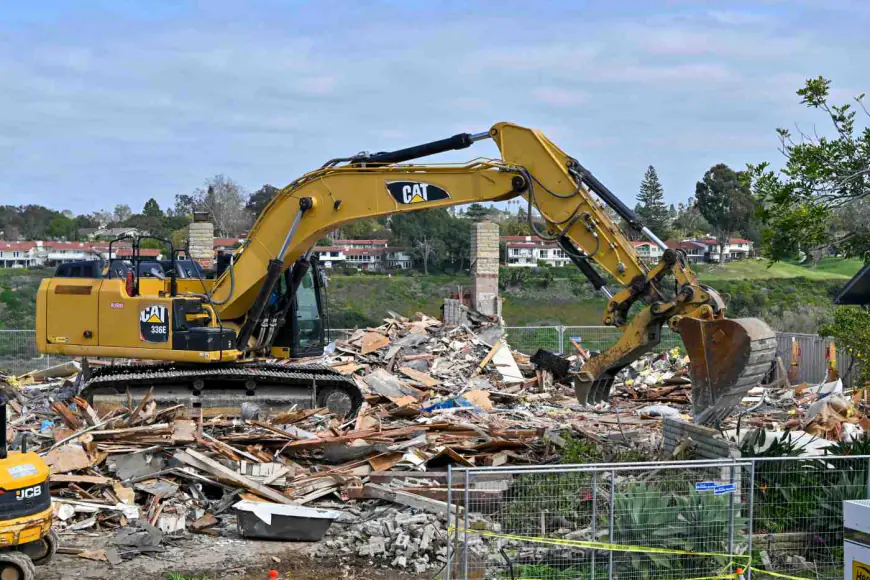Alameda County divests from Caterpillar over equipment sales to Israel
Alameda County divested $32 million from the construction equipment company Caterpillar on Tuesday in response to outrage by activists over the use of the equipment by Israel’s military to build settlements in Palestinian communities. With the Board of Supervisors’ vote this week approving the move, Alameda County becomes the largest regional government in the U.S. to […]

Alameda County divested $32 million from the construction equipment company Caterpillar on Tuesday in response to outrage by activists over the use of the equipment by Israel’s military to build settlements in Palestinian communities.
With the Board of Supervisors’ vote this week approving the move, Alameda County becomes the largest regional government in the U.S. to strip public funds from corporations that support Israel’s occupation of the Palestinian territories of the Gaza Strip and the West Bank as part of a new effort to craft an ethical investment policy.
“I have initiated the sale of three bonds from the Caterpillar corporation. Two of our three positions have already been sold,” Alameda County Treasurer Henry C. Levy, the only Jewish elected official in the county, said at Tuesday’s Board of Supervisors meeting. “I am committed to working with community members to ensure the fiscal policies of our county create safe and sound impacts within the county with our investment’s impact.”
The bonds represent 0.3% of Alameda County’s $11 billion investment portfolio. Levy said Caterpillar’s investments would become a “distraction” to creating a new ethical investment policy because of concerns around the company’s reputation. He said divestment from other companies in the county’s portfolio can not be decided until a full analysis is performed.
Caterpillar did not respond to the Bay Area New Group’s request for comment.
The strategy of divestment is heralded by activists for removing financial support from targeted entities by selling off bonds, contracts, and other investments. Divestment has historically been used to oppose apartheid in South Africa, spurring global support and the eventual collapse of the regime in 1994.
Violence in Gaza escalated after the Oct. 7, 2023 attack by Hamas that killed 1,200 Israelis. Israel’s war in Gaza following the attack has killed nearly 45,000 Palestinians, according to Gaza’s Health Ministry.
Around the Bay Area, pro-Palestinian activists have demanded divestment from Israel and many companies that do business with it. For months, the organization Bay Area Divest! has called for divestment from Caterpillar, which they claim knowingly sold its powerful D9 bulldozer to Israel’s military for use in the demolition of Palestinian homes to make way for future Israeli settlements. The international nonprofit Human Rights Watch has called on Caterpillar to suspend sales to the Israeli military since 2004.
“By challenging corporations like Caterpillar, we are paving the way for a future where human rights are non-negotiable,” said economist Michelle Williams, a representative of Bay Area Divest! in a statement. “Our success shows that divestment is not just a tool for accountability—it’s a way to reshape public expectations and redefine what we collectively accept as just and ethical.”
At the meeting Tuesday night, pro-Palestinian supporters spilled out of the Board of Supervisors chambers, forcing officials to open an overflow room. More than 100 residents spoke during the public comment period that extended well into the evening.
Supervisor Keith Carson led the Board of Supervisors in calling for an ethical investment policy and the divestment from companies that support Israel’s occupation efforts. He said he had traveled to the Middle East last week and observed the human toll of the war in Gaza and the escalating conflict across the region.
“Alameda County has a history of making investment decisions in alignment with our values such as the September 1985 unanimous action to divest from South Africa and the September 1996 unanimous decision to bar investing in companies that do business with Burma,” Carson said. “This is an attempt for us to pump the breaks, if not for us to continue to show that we all have to learn to co-exist.
The vast majority of speakers during public comment supported the divestment.
“I want to look you each in the eyes as you vote for or against this, and I will never forget any of these votes,” a District 3 resident who identified themselves as E said. “I want to watch you adopt the ethical investment strategy.”
Though Levy had already initiated the sale of Caterpillar Inc. bonds, the county treasurer sought more prescriptive language for a formal ethical investment policy to be applied for the county. The crux of this issue, he said, came between positive screening – investing in favor of industries aligned with the county’s values – versus negative screening, which he feared could change with political headwinds.
“You begin to put this laundry list of bad things – tobacco, private prisons – you begin to long list of things on it and I don’t think that’s a good way to write policy,” Levy said. “People are here for one particular issue, but next year there might be a different issue. And I don’t want to write a policy specifically about one issue.”
Supervisor David Haubert was skeptical of the divestment strategy’s effectiveness in countering Israel’s occupation of Palestine and its use of Caterpillar bulldozers. He questioned whether Caterpillar should be held to the same standard as weapons manufacturers whose products are used by the Israeli military.
“I don’t believe that Caterpillar said, ‘Please go use our tractors this way.’” Haubert said, drawing groans from the audience. “My fear is, if it’s not one tractor, then it’s another tractor. And where do you draw the line? If you divest from all tractors, then how do we build homes?”
Where to draw the line for divestment will be the central question over the next 90 days for Levy and the Treasury Oversight Committee, who will craft a comprehensive investment policy to present to the Board of Supervisors. For pro-Palestinin activists, however, the county’s decision to proceed with divestment from Israel is the most significant victory in over a year of campaigning for an end to the war in Gaza. When the Board of Supervisors gave their unanimous approval, the supervisors’ chambers filled with the sound of activists’ cheers and the waving of Palestinian flags.
Divestment is just one tool, Levy said, but he hoped the decision would lead to a more secure and safe community in Alameda County for Jews and Palestinians alike.
“I feel a great sorrow that long histories of trauma have triggered fear, still trigger fear and other emotions when issues like this emerge,” Levy said. “This decision, and any future divestment decision that our office may make, is about adhering to the values of Alameda County and the principles of a more profound understanding of socially responsible investing.”
What's Your Reaction?









































































































